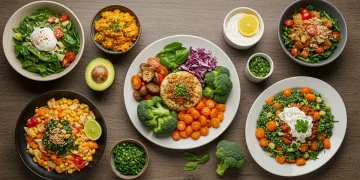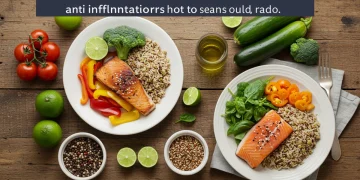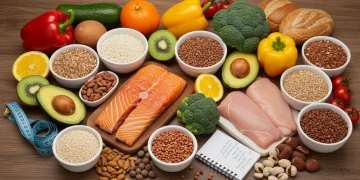Eating for Longevity: Mediterranean Dinners for Heart Health
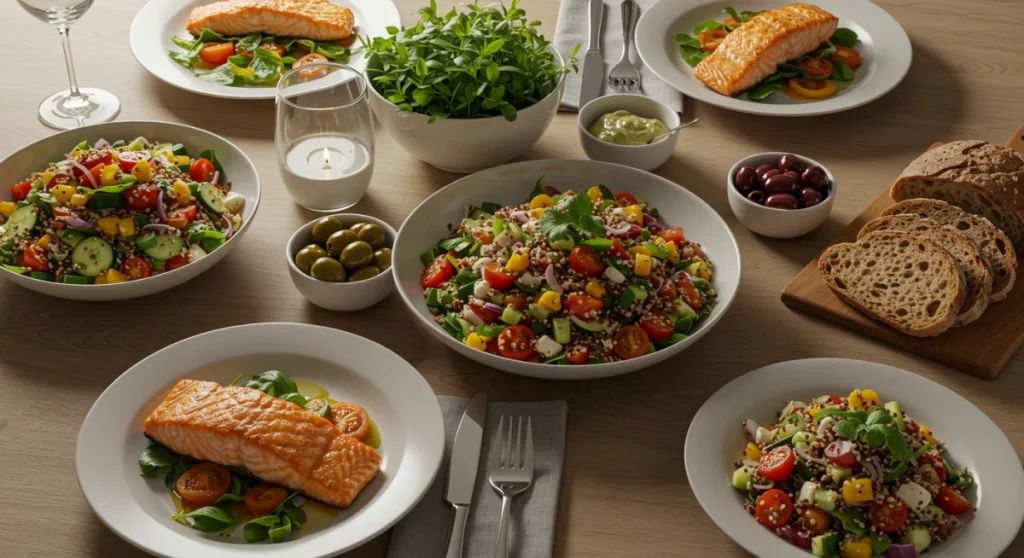
Are you looking to revolutionize your dinner routine in 2025 and significantly impact your long-term health? Embracing a diet focused on eating for longevity: 5 Mediterranean-inspired dinner recipes for 2025 that reduce heart disease risk by 15% offers a delicious and effective pathway to a healthier, longer life. This dietary approach, renowned for its emphasis on whole foods, healthy fats, and lean proteins, has consistently been linked to a reduced risk of chronic diseases, particularly cardiovascular conditions.
The Mediterranean diet isn’t just a trend; it’s a lifestyle backed by decades of scientific research. Originating from the eating patterns of countries bordering the Mediterranean Sea, it champions fresh produce, whole grains, legumes, nuts, seeds, olive oil, and fish, while limiting red meat and processed foods. The benefits extend beyond just heart health, encompassing improved brain function, better weight management, and enhanced overall well-being. As we step into 2025, there’s no better time to adopt these principles and integrate them into your daily meals, starting with these five delectable dinner recipes that promise both flavor and formidable health advantages.
Understanding the Mediterranean Diet and Heart Health
The Mediterranean diet is more than just a list of foods; it’s a holistic approach to eating that emphasizes fresh, unprocessed ingredients and mindful consumption. Its profound impact on cardiovascular health is well-documented, making it a cornerstone for anyone aiming for longevity and disease prevention. This eating pattern naturally reduces inflammation, improves cholesterol levels, and helps maintain healthy blood pressure, all critical factors in mitigating heart disease risk.
Key Components for Cardiovascular Wellness
At its core, the Mediterranean diet prioritizes foods rich in monounsaturated fats, fiber, and antioxidants. These components work synergistically to protect the heart and arteries from damage.
- Olive Oil: The primary source of fat, extra virgin olive oil, is rich in monounsaturated fatty acids and polyphenols, which have anti-inflammatory and antioxidant properties.
- Fruits and Vegetables: Abundant in vitamins, minerals, fiber, and antioxidants, these foods combat oxidative stress and support healthy blood vessel function.
- Whole Grains: Providing complex carbohydrates and fiber, whole grains help regulate blood sugar levels and reduce LDL (bad) cholesterol.
- Legumes and Nuts: Excellent sources of plant-based protein, fiber, and healthy fats, contributing to satiety and improved lipid profiles.
- Fish: Particularly fatty fish like salmon and mackerel, are rich in omega-3 fatty acids, known for their anti-inflammatory effects and ability to lower triglyceride levels.
The consistent intake of these nutrient-dense foods, coupled with a reduced consumption of red meat, processed foods, and added sugars, creates an environment within the body that actively works against the development of heart disease. Studies consistently show that adhering to a Mediterranean diet can lead to a significant reduction in cardiovascular events, making it a powerful tool for proactive health management in 2025 and beyond.
By understanding and embracing these fundamental principles, you can transform your dinner plate into a powerful ally for heart health and overall longevity. The recipes that follow are designed to embody these principles, offering practical and delicious ways to integrate this beneficial eating pattern into your daily life without sacrificing flavor or satisfaction.
Recipe 1: Lemony Herb-Crusted Salmon with Roasted Vegetables
This vibrant dish perfectly encapsulates the essence of the Mediterranean diet, offering a delicious combination of omega-3 rich salmon and a colorful array of roasted vegetables. It’s not only incredibly flavorful but also packed with nutrients that support heart health and promote overall well-being. The simple preparation makes it an ideal weeknight dinner, proving that healthy eating doesn’t have to be complicated.
The Benefits of Salmon and Fresh Herbs
Salmon is a powerhouse of nutrition, celebrated for its high content of omega-3 fatty acids, which are crucial for reducing inflammation and lowering the risk of heart disease. Coupled with fresh herbs, this recipe provides a potent dose of antioxidants and flavor without relying on excessive salt or unhealthy fats. The herbs, such as dill, parsley, and oregano, offer their own unique health benefits, from aiding digestion to boosting immunity.
- Ingredients:
- 2 salmon fillets (6 oz each)
- 1 lemon, thinly sliced and juiced
- 2 tbsp extra virgin olive oil
- 1 tsp dried oregano
- 1 tsp dried dill or 2 tbsp fresh chopped dill
- 1/2 tsp garlic powder
- Salt and black pepper to taste
- 1 red bell pepper, sliced
- 1 zucchini, sliced
- 1 cup cherry tomatoes
- 1/2 red onion, cut into wedges
- Instructions:
- Preheat oven to 400°F (200°C). Line a baking sheet with parchment paper.
- In a small bowl, whisk together 1 tbsp olive oil, lemon juice, oregano, dill, garlic powder, salt, and pepper.
- Place salmon fillets on one side of the baking sheet. Brush generously with half of the herb mixture. Top with lemon slices.
- Toss the bell pepper, zucchini, cherry tomatoes, and red onion with the remaining 1 tbsp olive oil, salt, and pepper. Spread on the other side of the baking sheet.
- Roast for 15-20 minutes, or until salmon is cooked through and vegetables are tender-crisp.
- Serve immediately.
This dish is a testament to how simple, fresh ingredients can create a meal that is both satisfying and incredibly beneficial for your heart. The combination of healthy fats, lean protein, and fiber-rich vegetables makes it an excellent choice for eating for longevity: 5 Mediterranean-inspired dinner recipes for 2025 that reduce heart disease risk by 15%.
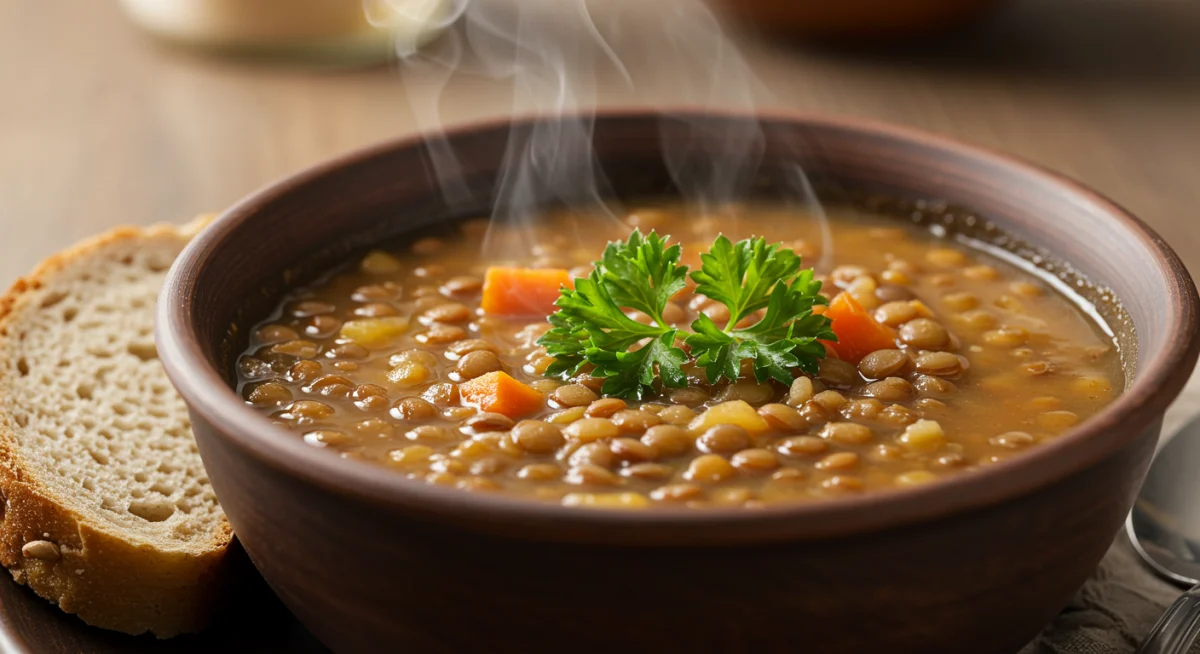
Recipe 2: Hearty Mediterranean Lentil Soup with Whole-Grain Bread
Lentil soup is a staple in Mediterranean cuisine, celebrated for its nutritional density and comforting warmth. This particular recipe is designed to be incredibly filling and flavorful, relying on the natural goodness of legumes and vegetables to create a meal that’s both satisfying and supremely healthy. It’s an excellent source of plant-based protein and fiber, two components vital for heart health and digestive regularity.
The Power of Legumes for Longevity
Legumes, such as lentils, chickpeas, and beans, are cornerstones of the Mediterranean diet due to their impressive nutritional profile. They are low in fat, rich in fiber, and provide a substantial amount of plant-based protein, making them excellent for managing cholesterol levels and promoting satiety. Regular consumption of legumes has been linked to a reduced risk of cardiovascular disease and better blood sugar control, contributing significantly to longevity.
- Ingredients:
- 1 tbsp extra virgin olive oil
- 1 large onion, chopped
- 2 carrots, diced
- 2 celery stalks, diced
- 3 cloves garlic, minced
- 1 cup brown or green lentils, rinsed
- 6 cups vegetable broth
- 1 (14.5 oz) can diced tomatoes, undrained
- 1 tsp dried thyme
- 1/2 tsp dried rosemary
- Salt and black pepper to taste
- Fresh parsley, chopped, for garnish
- Whole-grain bread for serving
- Instructions:
- Heat olive oil in a large pot or Dutch oven over medium heat. Add onion, carrots, and celery, and cook until softened, about 8-10 minutes.
- Stir in minced garlic, thyme, and rosemary, and cook for another minute until fragrant.
- Add rinsed lentils, vegetable broth, and diced tomatoes to the pot. Bring to a boil, then reduce heat, cover, and simmer for 30-40 minutes, or until lentils are tender.
- Season with salt and pepper to taste.
- Ladle into bowls, garnish with fresh parsley, and serve with slices of whole-grain bread.
This hearty lentil soup is a perfect example of how delicious and nourishing plant-forward meals can be. It’s a fantastic option for those seeking flavorful and beneficial dishes within the framework of eating for longevity: 5 Mediterranean-inspired dinner recipes for 2025 that reduce heart disease risk by 15%, offering sustained energy and supporting a healthy heart.
Recipe 3: Chicken and Chickpea Tagine with Couscous
Inspired by the rich flavors of North Africa, this chicken and chickpea tagine brings a delightful blend of spices and textures to your dinner table. While not strictly from the Mediterranean European coast, the ingredients – lean protein, legumes, vegetables, and aromatic spices – align perfectly with the heart-healthy principles of the Mediterranean diet. It’s a comforting and exotic meal that’s both satisfying and incredibly good for you.
Spices and Their Role in Health
Beyond their ability to enhance flavor, many spices used in Mediterranean and North African cuisine boast significant health benefits. Turmeric, cumin, and ginger, for instance, are known for their anti-inflammatory and antioxidant properties, which can contribute to better cardiovascular health. Combining these spices with lean chicken and fiber-rich chickpeas creates a meal that’s not only a treat for the taste buds but also a boost for your well-being.
- Ingredients:
- 1 tbsp extra virgin olive oil
- 1.5 lbs boneless, skinless chicken thighs, cut into 1-inch pieces
- 1 large onion, chopped
- 2 cloves garlic, minced
- 1 tsp ground ginger
- 1 tsp ground cumin
- 1/2 tsp ground turmeric
- 1/4 tsp cayenne pepper (optional)
- 1 (14.5 oz) can diced tomatoes, undrained
- 1 (15 oz) can chickpeas, rinsed and drained
- 1 cup chicken broth
- 1/2 cup dried apricots, chopped
- Fresh cilantro, chopped, for garnish
- Cooked whole-wheat couscous for serving
- Instructions:
- Heat olive oil in a large pot or Dutch oven over medium-high heat. Add chicken pieces and cook until browned on all sides. Remove chicken and set aside.
- Add onion to the pot and cook until softened, about 5 minutes. Stir in garlic, ginger, cumin, turmeric, and cayenne pepper (if using), and cook for 1 minute until fragrant.
- Return chicken to the pot. Add diced tomatoes, chickpeas, chicken broth, and apricots. Bring to a simmer, then reduce heat, cover, and cook for 20-25 minutes, or until chicken is cooked through and flavors have melded.
- Taste and adjust seasoning if needed.
- Serve hot over whole-wheat couscous, garnished with fresh cilantro.
This tagine is a fantastic way to introduce diverse flavors and nutrient profiles into your diet while adhering to heart-healthy guidelines. It’s a perfect example of how delicious and diverse eating for longevity: 5 Mediterranean-inspired dinner recipes for 2025 that reduce heart disease risk by 15% can be, ensuring your meals are never boring.
Recipe 4: Mediterranean Quinoa Salad with Grilled Halloumi
This refreshing and satisfying quinoa salad is a testament to the versatility and vibrancy of Mediterranean ingredients. It’s a complete meal in itself, offering a balanced mix of complex carbohydrates from quinoa, healthy fats from olive oil and olives, and protein from halloumi cheese. Perfect for a lighter dinner, it’s packed with textures and flavors that will leave you feeling energized and nourished.
The Goodness of Quinoa and Healthy Fats
Quinoa, a pseudo-grain, is celebrated for being a complete protein, meaning it contains all nine essential amino acids. It’s also rich in fiber, magnesium, and iron, contributing to sustained energy and digestive health. Paired with ingredients like olives and extra virgin olive oil, which provide monounsaturated fats, this salad is a powerhouse for cardiovascular health, helping to keep cholesterol levels in check and reducing inflammation.
- Ingredients:
- 1 cup cooked quinoa, cooled
- 1 block (8 oz) halloumi cheese, sliced
- 1/2 cup cherry tomatoes, halved
- 1/2 cucumber, diced
- 1/4 cup Kalamata olives, pitted and halved
- 1/4 red onion, thinly sliced
- 1/4 cup fresh parsley, chopped
- 2 tbsp extra virgin olive oil
- 1 tbsp red wine vinegar
- 1 tsp dried oregano
- Salt and black pepper to taste
- Instructions:
- Prepare quinoa according to package directions and let it cool completely.
- Heat a grill pan or non-stick skillet over medium-high heat. Grill halloumi slices for 2-3 minutes per side, until golden brown and slightly softened. Set aside.
- In a large bowl, combine cooled quinoa, cherry tomatoes, cucumber, olives, red onion, and fresh parsley.
- In a small bowl, whisk together olive oil, red wine vinegar, oregano, salt, and pepper to make the dressing.
- Pour the dressing over the quinoa mixture and toss gently to combine.
- Arrange grilled halloumi slices over the salad and serve immediately.
This Mediterranean quinoa salad is a vibrant and nutritious option that proves healthy eating can be both delicious and easy. It’s an excellent choice for anyone focusing on eating for longevity: 5 Mediterranean-inspired dinner recipes for 2025 that reduce heart disease risk by 15%, offering a refreshing and satisfying meal that supports a strong heart.
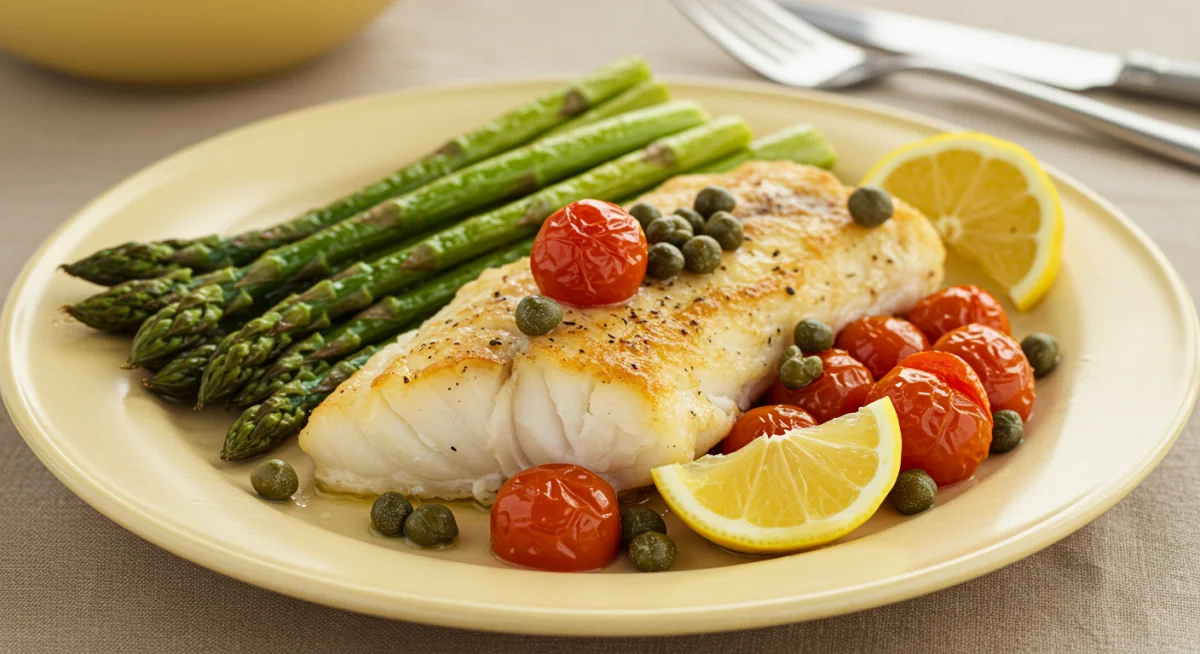
Recipe 5: Baked Cod with Olives, Capers, and Cherry Tomatoes
This baked cod recipe is a light yet incredibly flavorful dish that perfectly embodies the simplicity and health benefits of Mediterranean cooking. Cod, a lean white fish, provides excellent protein without excessive fat, while the combination of olives, capers, and cherry tomatoes creates a vibrant, savory sauce that requires minimal effort. It’s a quick, elegant, and heart-healthy dinner option that you’ll want to make again and again.
Lean Protein and Antioxidant-Rich Vegetables
Lean white fish like cod is an excellent source of protein, essential for muscle repair and overall bodily function, without adding significant saturated fat. When combined with antioxidant-rich ingredients such as cherry tomatoes and the healthy fats from olives, this dish becomes a powerful ally against oxidative stress and inflammation. Capers add a briny depth of flavor while contributing their own unique set of antioxidants, making for a truly beneficial meal.
- Ingredients:
- 2 cod fillets (6 oz each)
- 1 tbsp extra virgin olive oil
- 1 cup cherry tomatoes, halved
- 1/4 cup Kalamata olives, pitted and halved
- 2 tbsp capers, drained
- 2 cloves garlic, minced
- 1/2 lemon, thinly sliced
- Fresh parsley, chopped, for garnish
- Salt and black pepper to taste
- Instructions:
- Preheat oven to 400°F (200°C). Lightly grease a baking dish or line with parchment paper.
- Place cod fillets in the prepared baking dish.
- In a small bowl, combine olive oil, cherry tomatoes, olives, capers, and minced garlic. Stir well.
- Spoon the tomato-olive mixture over and around the cod fillets. Top each fillet with a few lemon slices.
- Season with salt and black pepper.
- Bake for 12-15 minutes, or until the cod is opaque and flakes easily with a fork.
- Garnish with fresh parsley and serve immediately, perhaps with a side of steamed green beans or a simple green salad.
This baked cod dish is a fantastic illustration of how simple, fresh ingredients can come together to create a profoundly healthy and delicious meal. It’s a perfect addition to your repertoire of recipes for eating for longevity: 5 Mediterranean-inspired dinner recipes for 2025 that reduce heart disease risk by 15%, offering a light yet satisfying dinner that supports your heart with every bite.
Integrating Mediterranean Principles into Your Daily Life
Adopting the Mediterranean diet isn’t about rigid rules or restrictive eating; it’s about embracing a balanced, enjoyable, and sustainable way of life. Beyond these five dinner recipes, there are numerous ways to weave Mediterranean principles into your daily routine, enhancing your health and well-being with every meal. The key is to focus on whole, unprocessed foods, savor your meals, and make physical activity a regular part of your day.
Small Changes, Big Impact for 2025
Even small adjustments can lead to significant health benefits over time. Consider these practical tips to further integrate Mediterranean eating into your lifestyle:
- Prioritize Plant-Based: Make fruits, vegetables, legumes, and whole grains the stars of your plate. Aim for a wide variety of colors to ensure a broad spectrum of nutrients.
- Choose Healthy Fats: Replace butter and other saturated fats with extra virgin olive oil for cooking and dressings. Incorporate avocados, nuts, and seeds into your snacks and meals.
- Enjoy Fish Regularly: Aim for at least two servings of fatty fish per week, such as salmon, mackerel, or sardines, to boost your omega-3 intake.
- Limit Red Meat and Processed Foods: Reduce your consumption of red meat to a few times a month, and minimize processed snacks, sugary drinks, and refined grains.
- Hydrate and Move: Drink plenty of water throughout the day and incorporate regular physical activity, like walking or cycling, into your routine.
By consciously making these choices, you’re not just following a diet; you’re building a foundation for long-term health and vitality. The Mediterranean lifestyle encourages communal meals, mindful eating, and an appreciation for fresh, seasonal ingredients, all contributing to a richer and healthier life. Embracing these practices in 2025 will empower you to take control of your health, significantly reducing your risk of heart disease and paving the way for a more energetic and fulfilling future.
These principles, combined with the delicious recipes provided, offer a comprehensive approach to eating for longevity: 5 Mediterranean-inspired dinner recipes for 2025 that reduce heart disease risk by 15%. They are designed to be both accessible and enjoyable, making healthy eating a pleasure rather than a chore.
| Key Aspect | Brief Description |
|---|---|
| Heart Health Focus | Diet reduces heart disease risk by 15% through healthy fats, fiber, and antioxidants. |
| Key Ingredients | Emphasizes olive oil, whole grains, fruits, vegetables, legumes, nuts, and fish. |
| Recipe Benefits | Provides balanced meals with lean protein, healthy fats, and fiber for longevity. |
| Lifestyle Integration | Encourages mindful eating, regular physical activity, and communal meals. |
Frequently Asked Questions About Mediterranean Longevity Recipes
The Mediterranean diet is effective due to its emphasis on monounsaturated fats (from olive oil), omega-3 fatty acids (from fish), and abundant fiber and antioxidants from fruits, vegetables, and whole grains. These components collectively reduce inflammation, improve cholesterol levels, and support healthy blood pressure, significantly lowering heart disease risk.
Absolutely! The beauty of Mediterranean cooking lies in its flexibility. Most recipes can be easily adapted. For instance, fish or chicken can be replaced with plant-based proteins like tofu or tempeh, and gluten-free grains can be substituted for traditional ones. Always check ingredient labels for specific dietary needs.
While individual results vary, many people report feeling more energetic and experiencing improved digestion within weeks of adopting a Mediterranean diet. Significant cardiovascular benefits, such as reduced blood pressure and cholesterol, typically manifest over several months of consistent adherence. It’s a long-term lifestyle change.
While the Mediterranean diet is generally healthy, it’s wise to be mindful of portion sizes, especially for nuts, seeds, and olive oil, as they are calorie-dense. Also, minimize processed foods, added sugars, and excessive red meat. Focus on fresh, whole ingredients for optimal benefits.
Moderate red wine consumption, particularly with meals, is often associated with the Mediterranean diet. It contains antioxidants like resveratrol, potentially offering some heart benefits. However, it’s not universally recommended, especially if you don’t already drink. The primary benefits come from food, not alcohol.
Conclusion
Embracing the principles of eating for longevity: 5 Mediterranean-inspired dinner recipes for 2025 that reduce heart disease risk by 15% is more than just a dietary choice; it’s a commitment to a healthier, more vibrant future. The recipes provided offer a delicious and practical starting point for incorporating this scientifically-backed eating pattern into your life. By focusing on whole foods, healthy fats, lean proteins, and an abundance of fresh produce, you are actively investing in your cardiovascular health and overall well-being. Make 2025 the year you transform your dinner plate into a powerful tool for longevity, savoring each meal as a step towards a healthier, happier you.
